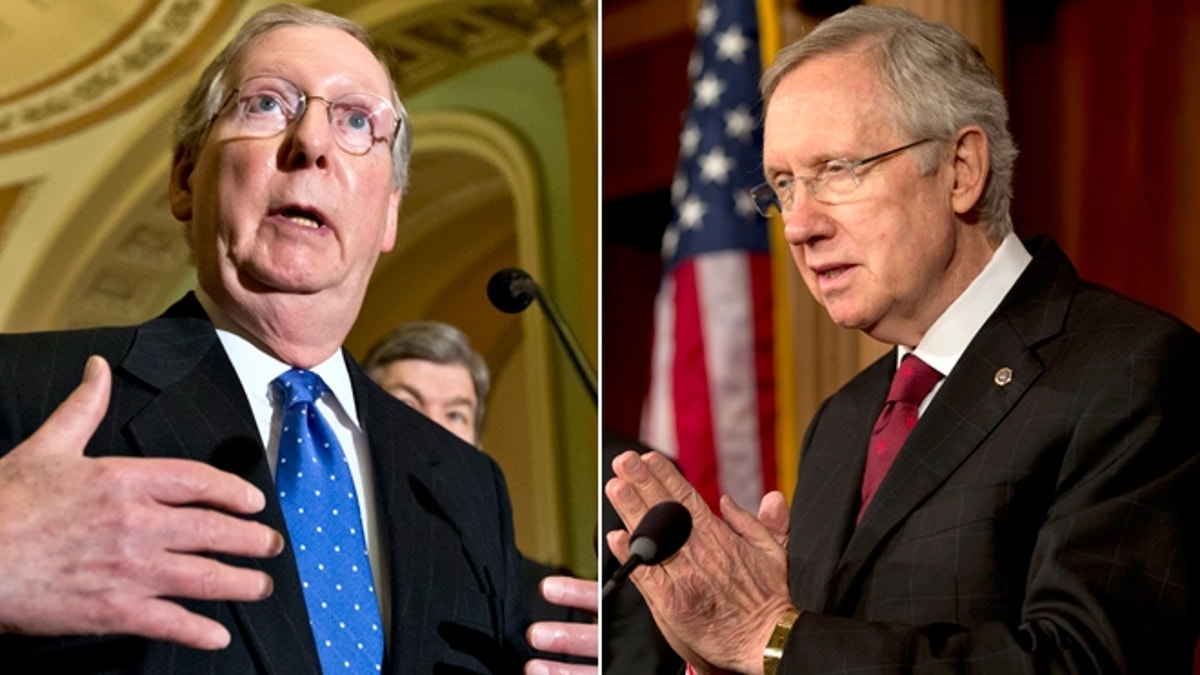
The Democratic and Republican Senate leaders tried to outmaneuver each other Thursday in a bid to gain political traction over President Obama's call for a permanent increase in the debt ceiling -- in the latest sign of how that demand has complicated negotiations over the looming fiscal crisis.
The political dance started a day earlier, when Senate Republican Leader Mitch McConnell tried to call a vote on Obama's fiscal plan which included granting the White House the ability to approve automatic increases in the debt ceiling. Democratic Leader Harry Reid blocked it, allowing McConnell to suggest even Democrats don't want Obama's plan to pass.
But then Reid turned around Thursday and proposed calling a vote in the afternoon on the debt-ceiling plan. Reid, though, wanted to call a simple majority vote -- McConnell objected, saying a 60-vote threshold was warranted. Reid in turn objected to that, and the entire vote was scuttled again.
Democrats emerged claiming McConnell had shot down his own proposal, though the proposal was actually Obama's.
The political posturing, though, did little to advance talks over the looming fiscal crisis, which were already held up over the issue of tax hikes. The White House and congressional Republicans continue to be at loggerheads over whether to raise tax rates on households making more than $250,000 as part of a deal to avoid indiscriminate and across-the-board tax hikes and spending cuts next month.
- Kansas Rep. Huelskamp charges Boehner punished him and others for conservative votes
- Obama to GOP: Don’t You Dare Give Me What I Asked For
- Boehner tells Obama to put deal on the table, amid growing caucus discontent
- DeMint leaving Senate to head Heritage Foundation
- Former Sen. Simpson dances to ‘Gangnam Style’ to raise debt awareness
- Pentagon now preparing for massive cuts as fiscal negotiations appear stalled
But Obama's latest demand on the debt ceiling has only complicated the already-shaky talks.
Even before McConnell and Reid began to trade jabs, Republican lawmakers sought to prove that the provision wouldn't clear the Senate. As of Wednesday evening, 43 senators had signed a letter to Obama opposing the debt-limit proposal. That represents enough votes to block the measure from passing.
"The Congress is ready to work with you as equal partners in addressing the coming fiscal cliff," Sen. Rob Portman, R-Ohio, and 42 other senators wrote. "We agree that Washington must rein in the debt, which is one reason we strongly oppose your proposal to eliminate Congress' role in establishing a federal debt limit."
They continued: "We believe that preserving Congress' role in setting the debt limit is necessary to encourage deficit reduction and uphold our constitutional tradition of legislative control over borrowing."
The letter was signed exclusively by Republicans.
McConnell, on the floor Wednesday, said the request for the power to unilaterally raise the debt ceiling was "most outrageous of all."
Concern about how the debt ceiling could factor into fiscal talks has aggravated both sides. Amid suggestions that Republicans could use a looming vote over the debt limit to extract more concessions from Democrats, Obama and his allies began to press for an increase -- preferably for Obama, a permanent one -- to be part of any deal.
Republicans argue that the debt ceiling votes are a vital tool for Congress to extract spending cuts and ultimately rein in the deficit. Democrats, though, argue that the debt ceiling votes have the potential to become increasingly damaging to the country, citing the melee in August 2011 in which the country narrowly averted default.
President Obama on Wednesday told a business group that allowing Republicans to use the debt-limit vote as leverage "is not a game that I will play."
"We can't afford to go there again," Obama said, warning that it is "a weapon" that just damages the U.S. credit rating.
On Tuesday, White House Press Secretary Jay Carney said the debt ceiling should in some way be part of the deal.
"We can't have that kind of nonsense anymore," he said, referring to the 2011 debt-ceiling fight.
Obama and House Speaker John Boehner, who proposed his own fiscal crisis alternative plan earlier this week, spoke by phone Wednesday, sources said.
The two sides remain far apart, and Boehner urged Obama on Monday to put a new deal on the table if he cannot accept the House Republican proposal.




